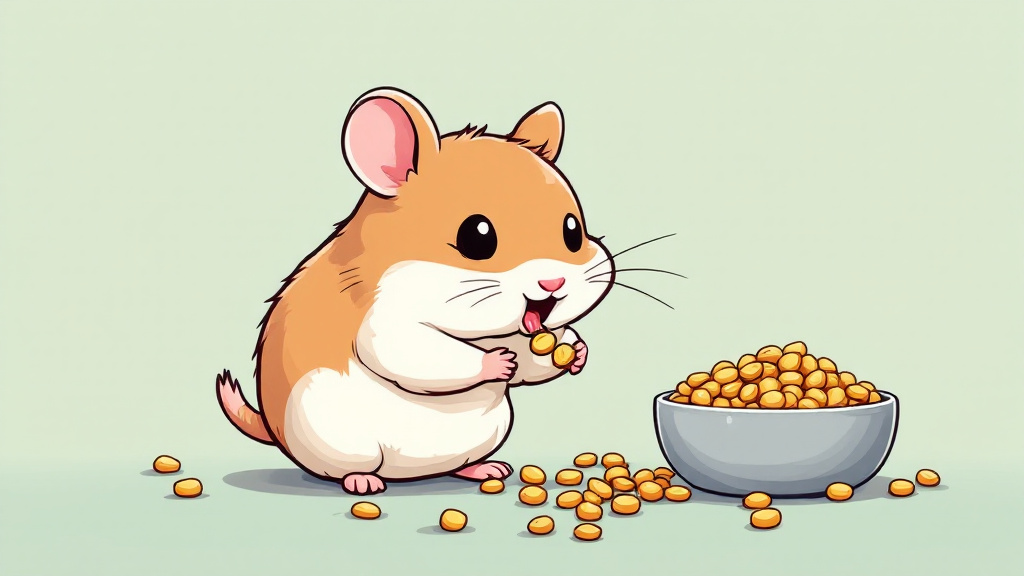Hamster owners often wonder whether feeding their pets rabbit pellets is safe, given that both animals are small and require special diets. However, while hamsters and rabbits may seem similar, their dietary needs are significantly different. This raises a crucial question: can hamsters eat rabbit pellets safely? Many owners are concerned that offering rabbit food might lead to health issues, but there’s also confusion around whether occasional consumption is harmful or not. Let’s clear up these misconceptions and dive into why the right diet matters for your hamster.
Understanding Hamster Dietary Needs
Hamster Diet Overview
Hamsters are omnivores, meaning they require a balanced mix of nutrients from both plant and animal sources. Unlike herbivorous rabbits, hamsters depend on a varied diet that provides the necessary protein, fat, and fiber for their health.
- Protein: Hamsters need about 15-25% of their diet to come from protein. This is essential for growth, cell repair, and maintaining a healthy body.
- Fats: A moderate amount of fat is crucial for energy and proper metabolic function.
- Fiber: While fiber is important for digestion, hamsters do not need as much as rabbits do. Their fiber intake should be balanced to avoid digestive issues.
Importance of a Balanced Diet
Proper nutrition is key to keeping your hamster healthy, active, and free from diseases. A well-balanced diet not only supports their physical growth and energy levels but also helps prevent common health problems like malnutrition, obesity, and digestive disorders. Feeding your hamster the right food tailored to their needs ensures they live a long and happy life.
Nutritional Composition of Rabbit Pellets
Rabbit Pellets Are Formulated for Herbivores
Rabbit pellets are specifically designed for herbivores, which means their primary focus is providing high fiber content to support the digestive needs of animals like rabbits. However, this high fiber content is excessive for hamsters, whose digestive systems aren’t built to handle such large amounts. In addition, rabbit pellets have lower levels of protein and fat, which are essential nutrients for hamsters. The result is a diet that fails to meet the nutritional requirements hamsters need to stay healthy.
Nutritional Mismatch
The key issue with feeding rabbit pellets to hamsters is the nutritional mismatch. Rabbit pellets don’t contain enough protein or fat to support a hamster’s growth, energy needs, and overall health. While the fiber content may be beneficial for rabbits, it’s too high for hamsters, which can lead to digestive problems. Hamsters require a carefully balanced diet that rabbit food simply cannot provide.
Potential Health Risks for Hamsters
Malnutrition
One of the most significant risks of feeding hamsters rabbit pellets is malnutrition. Without enough protein, hamsters may struggle with growth, immune function, and overall vitality. The lack of balanced nutrients can lead to serious deficiencies over time, weakening your hamster’s health and leaving them more susceptible to illness.
Gastrointestinal Issues
The high fiber content in rabbit pellets can overwhelm a hamster’s digestive system, leading to gastrointestinal issues like diarrhea, bloating, and discomfort. While rabbits thrive on fiber-rich diets, hamsters require a more moderate amount, and excessive fiber can cause serious digestive upset.
Long-Term Health Consequences
Regular consumption of rabbit pellets can result in chronic health problems for hamsters. Over time, malnutrition and digestive issues can compound, leading to weakened bones, poor coat condition, lethargy, and even organ damage. A diet that lacks the right balance of nutrients puts your hamster’s long-term health at risk.
What To Do If Your Hamster Eats Rabbit Pellets
Accidental Consumption
If your hamster accidentally nibbles on a rabbit pellet, there’s no need to panic. A small amount of rabbit food is unlikely to cause any immediate harm. However, it’s important to ensure that this does not become a regular occurrence. Rabbit pellets lack the essential nutrients your hamster needs, so it’s best to prevent them from eating it routinely.
Monitoring for Symptoms
After accidental consumption, keep an eye on your hamster for any signs of digestive distress. Look for symptoms like diarrhea, bloating, or changes in behavior such as lethargy or discomfort. If you notice any of these issues, it may be a result of the high fiber content in rabbit pellets. In most cases, these symptoms should resolve quickly once your hamster returns to its normal diet.
Return to a Proper Diet
To avoid long-term health problems, make sure your hamster is eating a diet that’s specifically designed for their needs. High-quality hamster food will provide the right balance of protein, fats, and fiber, keeping your pet healthy and happy. If your hamster accidentally consumes rabbit pellets, simply ensure they return to their appropriate diet as soon as possible.
Conclusion
In summary, while hamsters may nibble on rabbit pellets occasionally without immediate harm, they should not be a part of their regular diet. The nutritional composition of rabbit pellets is unsuitable for hamsters and can lead to malnutrition and digestive issues if consumed regularly. Providing a balanced, hamster-specific diet is crucial to ensure your pet receives the nutrients they need for a long, healthy life. Feeding your hamster the right food is one of the most important ways to care for their well-being.

